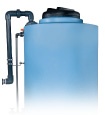Most chemicals emit vapors during storage, but certain substances present unique challenges that demand specialized solutions. Chemicals such as hydrochloric acid, acetic acid, and hydrofluoric acid generate particularly corrosive vapors that cannot be safely released into the environment. These aggressive fumes pose serious risks to storage infrastructure, surrounding equipment, and personnel safety.
Topics:
Venting
Poly Processing manufactures a wide variety of storage tank systems that are compatible with many different chemicals, including fuming chemicals that must be securely sealed when stored. For these chemical applications, the use of a fume-tight lid is usually required. Let’s take a closer look at how a fume-tight lid functions, when a fume-tight lid might be required, and what options are available to meet your chemical storage needs.
Topics:
Venting,
Fittings and Accessories
Proper venting of a chemical storage tank system helps ensure safe operation and can also extend the useful life of the cross-linked polyethylene (XLPE) tank. Poly Processing Company sees venting as one of the most critical parts of a safe chemical storage system. We also attach venting labels to tanks manufactured at our facilities to emphasize the critical importance of proper venting.
Topics:
Venting
Proper venting of a chemical storage tank system helps ensure safe operation and can also extend the useful life of the cross-linked polyethylene (XLPE) tank. Poly Processing Company sees venting as one of the most critical parts of a safe chemical storage system. We also attach venting labels to tanks manufactured at our facilities to emphasize the critical importance of proper venting.
Topics:
Venting,
FAQs
Proper venting of polyethylene chemical storage tanks is vital for safe operation — it’s also critical for maximizing a polyethylene storage tank's effective lifecycle. Poly Processing's chemical storage tanks are designed to function at atmospheric pressure per ASTM-D 1998, the industry standard for producing vertical polyethylene tanks. During pneumatic offloading from a tanker truck, offloading pressures can exceed 30 psi, resulting in high ACFM rates.
Topics:
Venting
You may spend a little more on a Poly Processing cross-linked polyethylene tank, but it could possibly cost much you more to own other tanks. Here’s why.
Topics:
Venting,
Fittings and Accessories,
Tank Design and Materials
Polyethylene chemical storage tanks are designed to expand and contract slightly in response to changes in temperature and internal pressure. But if your tank isn’t designed to handle the pressure it faces at key moments, you could be unknowingly setting yourself up for a tank failure.
Topics:
Venting
When building your storage tank system, it’s important to not only carefully consider the tank itself, but also the fittings and accessories. An important part of your tank is your manway cover. Failing to understand the purpose and function of the manway can threaten the safety of your employees and result in leaks, tank damage, and environmental hazards. Let’s look at three things you should consider when choosing a manway cover. We’ll also introduce the best options for each consideration.
Topics:
Venting
Pneumatically-filled tanks must be properly vented to avoid offloading pressures, which increase the tank interior pressure beyond the ASTM-D 1998 regulation allowances. The right manway cover can provide the venting required to avoid this situation, but it can be difficult to know exactly which type to choose.
Topics:
Venting
Pneumatically filled chemical storage tanks have the potential for becoming over-pressurized. Over-pressurizing a storage tank through repeated fill cycles can damage and weaken the tank sidewalls, resulting in stress cracks and premature tank failure. Proper tank venting is needed to prevent over-pressurization.
Topics:
Venting



